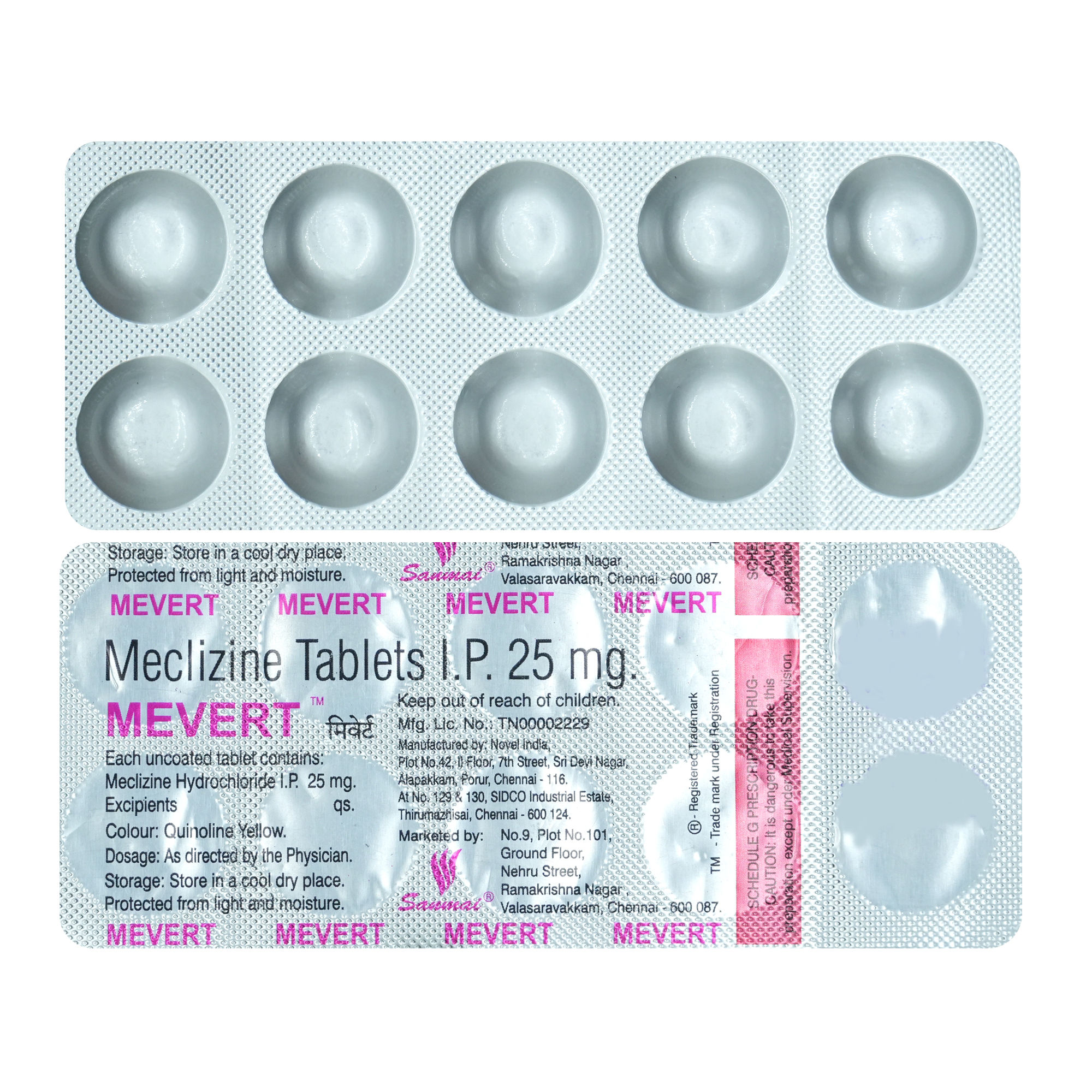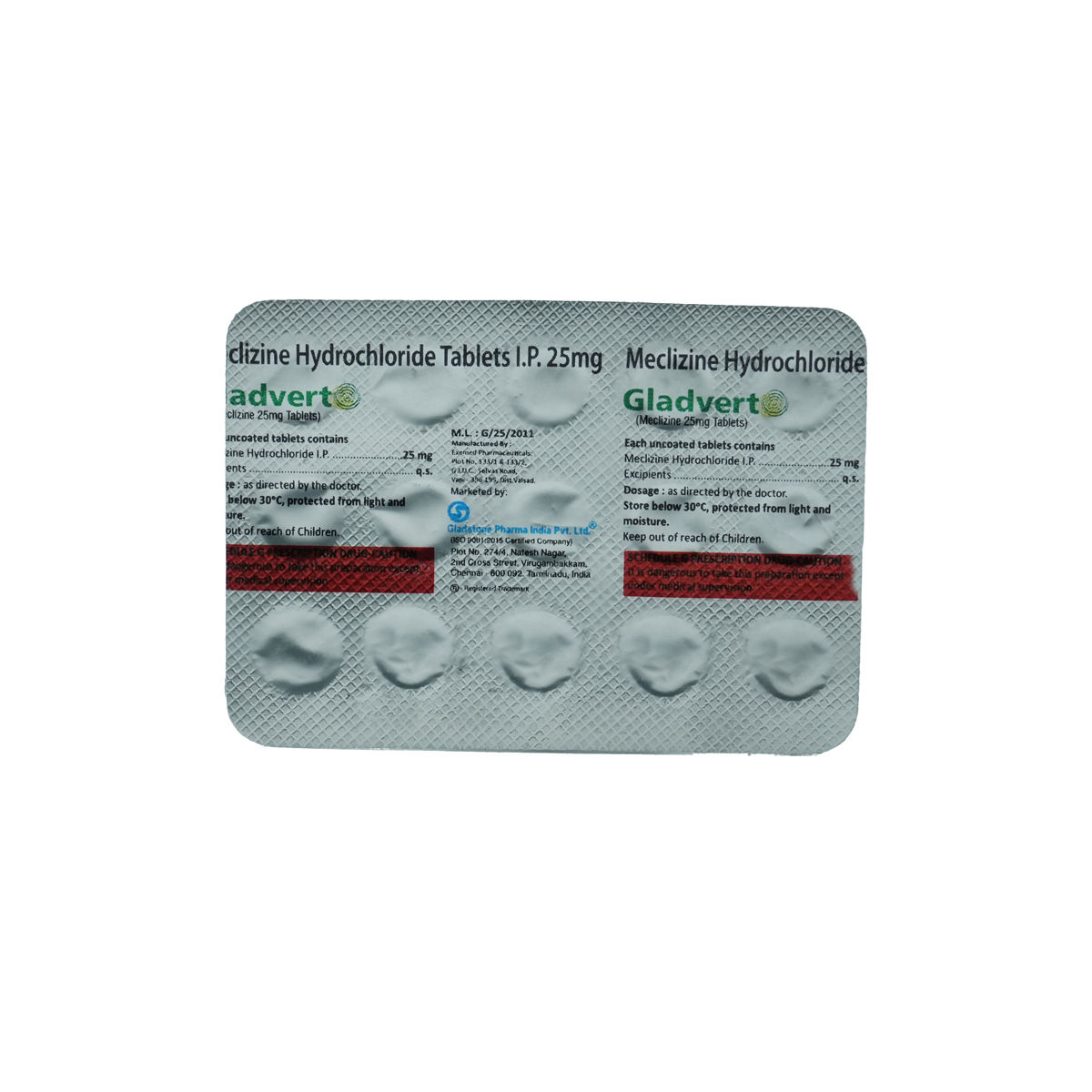Meclizine
About Meclizine
Meclizine is used to treat travel sickness (also called motion sickness). It is also used to treat dizziness and sickness caused by inner ear problems (such as vertigo). Motion sickness is feeling sick when travelling by car, boat, plane or train. Vertigo makes you or everything around you feel dizzy - enough to affect your balance. It’s more than just dizziness.
Meclizine contains Meclizine, and It is classed as a drowsy (sedating) antihistamine. It blocks the effects of histamine in your brain to reduce symptoms of travel sickness. It also acts as a calcium channel blocker. This helps improve blood flow in the inner ear and reduces symptoms caused by vertigo.
Take Meclizine as prescribed by your doctor. You are advised to take Meclizine for as long as your doctor has prescribed it for you, depending upon your medical condition. In some cases, you may experience sleepiness, dry mouth, blurred vision, headache, and lethargy. Most of these side effects of Meclizine do not require medical attention and gradually resolve over time. However, if the side effects are persistent, reach out to your doctor.
Meclizines should not be taken if you have a peptic ulcer, asthma, low blood pressure, or urination problems. If you are pregnant or planning to get pregnant, or are breastfeeding, it is recommended not to take Meclizine. If your skin becomes yellow and urine also becomes pale yellow, consult your doctor immediately. Alcohol should not be consumed along with Meclizine as it may cause excessive drowsiness.
Uses of Meclizine
Medicinal Benefits
Meclizine contains Meclizine, a sedating antihistamine medication. It blocks histamine's effects in your brain to reduce symptoms of travel sickness (motion sickness). It also acts as a calcium channel blocker. This helps improve blood flow in the inner ear and reduces symptoms caused by vertigo.
Directions for Use
Storage
Side Effects of Meclizine
- Sleepiness
- Dry mouth
- Blurred vision
- Headache
- Lethargy
Drug Warnings
Do not take Meclizine if you are allergic to Meclizine or any of its ingredients. Inform your doctor about all other medications, herbal products you are taking or have been taking. If you have a problem emptying the urinary bladder, glaucoma (increase eye pressure), liver or kidney disease, asthma, an enlarged prostate, inform your doctor before starting Meclizine. Alcohol should not be consumed along with Meclizine as it may cause excessive drowsiness. If you are pregnant or planning to get pregnant, are breastfeeding, it is recommended not to take Meclizine. If your skin becomes yellow and urine also becomes pale yellow, consult your doctor immediately.
Drug Interactions
Drug-Drug Interactions: Meclizine is known to interact with Alzheimer's disease medications (donepezil, galantamine), anticholinergic (benztropine, scopolamine), antipsychotics (chlorpromazine, clozapine, fluphenazine, thioridazine, risperidone, trazodone), pain relievers (acetaminophen, aspirin, ibuprofen, codeine, hydrocodone, oxycodone), diuretics (furosemide), muscle relaxants (cyclobenzaprine, orphenadrine, baclofen, and methocarbamol), sedative-hypnotic (zolpidem, zaleplon, eszopiclone, temazepam, triazolam, estazolam, flurazepam, suvorexant, and doxepin), antihistamines (clemastine, carbinoxamine, diphenhydramine, and hydroxyzine).
Drug-Food Interactions: Meclizine is known to interact with alcohol and increase drowsiness.
Drug-Disease Interactions: Meclizine is known to interact in patients with glaucoma (increased eye pressure), kidney or liver problems, urinary tract blockage, an enlarged prostate, and asthma.
Drug-Drug Interactions Checker List:
Safety Advice

Alcohol
unsafeMeclizine should not be taken along with alcohol as it may increase sleepiness and drowsiness.

Pregnancy
cautionMeclizine is a pregnancy category B drug. It is not known whether it will harm the baby or not. But, it is recommended not to take it during pregnancy.

Breast Feeding
cautionMeclizine is not recommended in breastfeeding women.

Driving
unsafeMeclizine is known to cause sleepiness and blurred vision, so you should not operate any machinery or car which requires mental alertness.

Liver
cautionLet your doctor know if you have any history of liver diseases before using Meclizine. Your doctor will weigh the benefits and any potential risks before prescribing it to you.

Kidney
cautionLet your doctor know if you have any history of kidney diseases before using Meclizine. Your doctor will weigh the benefits and any potential risks before prescribing it to you.

Children
cautionMeclizine is not recommended for children below the age of 12 years.
Habit Forming
Diet & Lifestyle Advise
Try not to eat food immediately before travelling, as it will reduce your chances of vomiting while travelling.
Please do not drink alcohol as it could lead to excessive drowsiness.
Allow sufficient air to reach you while travelling as it will help reduce nausea, vomiting and reduce the ringing sensation of the ear.
Special Advise
Do not take Meclizine if you are about to undergo a skin test for an allergic reaction.
- Regular doctor check up for patients with glaucoma, enlarged prostate and asthma.
Patients Concern
Disease/Condition Glossary
Motion sickness: It is caused when nerves within your ear transmit false information about your brain's movement with signals. These nerves, along with signals from your eyes and muscles, enable your body to maintain a good sense of balance. It clashes with the signals received from your other ear, your eyes, or your body, whether the nerves in one of your ears transmit too many, too few, or incorrect messages to your brain. Your brain is then confused, which can cause dizziness and a feeling of spinning (vertigo) and make you feel sick. Travel sickness is triggered while flying by frequent irregular movements. These repetitive motions, like going over bumps or around in a circle, give your brain loads of messages. The equilibrium system in your ear sends distinct signals to those in your eyes, which results in mixed and contradictory messages being received by your brain. This is what makes you feel ill.
Vertigo: It is dizziness that creates a false sense that you or your surroundings are spinning or moving. It can make you feel similar to motion sickness.
FAQs
Meclizine is used to treat travel sickness (also called motion sickness). It is also used to treat dizziness and sickness caused by inner ear problems (such as vertigo).
Meclizine blocks histamine's effects in your brain to reduce travel sickness symptoms (motion sickness). It also acts as a calcium channel blocker. This helps improve blood flow in the inner ear and reduces symptoms caused by vertigo.
No, using Meclizine for a long duration can increase the side effects of Meclizine. It is mostly used for the long term in elderly patients with vertigo. So, Meclizine should always be taken in dose and duration prescribed by your doctor.
In certain cases, generally, in the elderly population, Meclizine can cause dementia. So, the people above age 65 years if taking Meclizine should take in dose and duration as prescribed by your doctor.
Meclizine should be taken exactly 1-2 hours before you are supposed to travel for best results as it takes approximately 1 hour to show its effect.
Yes, Meclizine is known to cause dry mouth. Increase your fluid intake and also do frequent mouth rinses to avoid the excessive thirst.
Meclizine also acts as a calcium channel blocker (they widen the blood vessels), it should be used with caution in patients with glaucoma and enlarged prostate. Meclizine should always be taken in dose and duration prescribed by your doctor.
Meclizine contains meclizine, an antihistamine drug. It is not a narcotic, addictive, or antibiotic drug. It does have anticholinergic properties, which means it can help reduce symptoms by blocking certain chemical signals in the body.
No, Meclizine is not available over the counter (OTC). It requires a prescription from a healthcare provider.
Meclizine is primarily used to treat nausea, vomiting due to motion sickness, and vertigo (dizziness). However, it is not typically used for hangovers, anxiety, or hives. However consult your doctor before taking Meclizine.
Meclizine can be taken with Zofran if advised by a doctor. Combining Meclizine with Xanax, Zyrtec, Allegra, and Percocet can increase side effects and drowsiness. Always consult your doctor before taking Meclizine with other medications to ensure safety and to avoid potential interactions.
Meclizine is generally safe to take with amoxicillin, lorazepam, phentermine, and ibuprofen if prescribed by your doctor. However, Meclizine may interact with tramadol, so it's important to consult your doctor before taking Meclizine with other medications.
Meclizine can cause sleepiness and constipation as side effects. However, it is not known to cause weight gain, raise blood sugar, or blood pressure. If these side effects persist or worsen, please consult your doctor.
Meclizine is generally considered safe when used at the prescribed doses and for the recommended duration. However, like all medications, it can cause side effects such as sleepiness, dry mouth, and constipation. If these side effects persist or worsen, please consult your doctor.
Meclizine contains Meclizine, an antihistamine as its active ingredient.
Take Meclizine in the dose and duration as advised by your doctor. Swallow it as a whole. Do not chew, crush or break it.
The common side effects of Meclizine are sleepiness, dry mouth, blurred vision, headache, and lethargy. If these side effects persist or worsen, please consult your doctor.
Meclizine is not recommended for children under 12 years of age, those with peptic ulcers, asthma, low blood pressure, urination issues, or those who drink alcohol. If you have any concerns regarding Meclizine, please consult your doctor.
You are recommended to avoid alcohol consumption while taking Meclizine as it may increase sleepiness and drowsiness.






